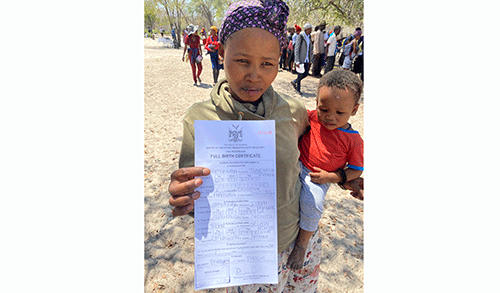OUSHINI – Statelessness, one of the serious human rights issues, has been put at the forefront of the ministry of home affairs’ agenda.
A stateless person is someone who is not considered a national of any state.
In a quest to eliminate statelessness and issues of undocumented people in the country, the ministry has embarked on regional tours to engage with community members as well as familiarise themselves with the issues of statelessness in the regions.
The visits, led by deputy minister Daniel Kashikola, started in the Ohangwena region last week and will continue to Kavango East this week.
In an interview with New Era, Kashikola said the preliminary assessment conducted by the ministry revealed there are still many undocumented Namibians and those who are at risk of becoming stateless, especially in the northern regions.
Although the statistics are not yet revealed, Kashikola said the matter is of serious concern and needs immediate intervention.
Among the victims of statelessness are children found abandoned in a state and who, in most cases, would as a result never have any nationality.
Trapped into a life in limbo that extends even to their adult years, these stateless persons illustrate how essential the right to nationality is to every person.
But that is just one of many problems associated with the issue of statelessness.
Kashikola said many people are at risk of becoming stateless; in some instances, a person is Namibian and was born in Namibia but they do not have documents to prove that they were born in the country.
“This situation occurs when parents give birth and abandon their children at their grandparents. If the mother of the child passes on and the father is maybe unknown, the child will end up stateless because it will be difficult to register this child when both parents are not available,” he explained.
Asked how the ministry will ensure stateless and undocumented people in the country are assisted, he said there is no legislation to legalise the status of undocumented and stateless persons in the country as yet, but there has been a steady improvement in governments’ awareness of statelessness over the last years.
After the assessment is complete, Kashikola said the ministry will find ways how they can address the issue at stake.
Kashikola said stateless people are denied a wide range of fundamental human rights, as they are often unable to obtain identity documents; they may be detained for reasons linked to their statelessness – and often, they are denied access to education and health services.
He also argued that most cases of statelessness are brought by the negligence and ignorance of parents who refuse to register their children for birth certificates.
Incomplete documentation is also another challenge that leads to statelessness.
During his information-sharing session with community members of Oushini village in the Ohangwena region, Kashikola urged parents to register their children for birth.
Adults with no documents were told to seek information from the ministry of home affairs on how they can acquire national documents.
Tashe Selma, a resident of Oushini and other community members, whose children were assisted with full birth certificates, applauded the ministry for bringing these services closer to the people.
“I didn’t have the means to travel 60km to town, but I am glad the ministry of home affairs has finally come to our rescue and our children now have documents,” said Tashe.
Seventy-nine children in the area of Okongo and Omundaungilo constituency in Ohangwena were registered for full birth certificates during Kashikola’s visit. – ashikololo@nepc.com.na


